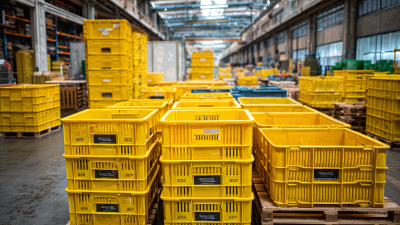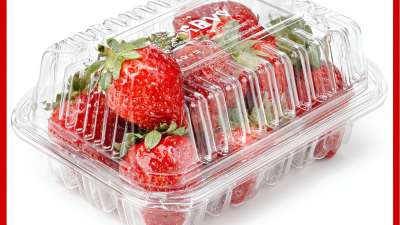What are the Benefits of Using Plastic Containers in Everyday Life
In today's fast-paced world, the use of plastic containers has become increasingly prevalent, offering a myriad of advantages that seamlessly fit into our everyday lives. From food storage to organization solutions, plastic containers provide convenience, durability, and versatility that traditional materials often lack. With their lightweight nature and resistance to breakage, these containers are ideal for a variety of settings, whether in the kitchen, for outdoor activities, or in packing for travel. Beyond practicality, plastic containers also contribute to sustainability efforts by promoting reusable practices, thereby reducing waste. In this blog, we will explore the top benefits of incorporating plastic containers into our daily routines, highlighting their role in enhancing efficiency, safety, and cost-effectiveness in our homes and beyond. Join us as we delve into the many ways plastic containers can transform the way we manage our resources and simplify our lives.

Benefits of Plastic Containers for Food Storage: A Cost-Effective Solution
When it comes to food storage, plastic containers offer a multitude of benefits that make them an excellent choice for everyday use. One of the primary advantages is their cost-effectiveness. Unlike glass or metal containers, plastic options are generally more affordable, allowing consumers to stock up on various sizes without breaking the bank. This affordability makes it easy to replace damaged or worn-out containers, ensuring that you always have a reliable option for storing leftovers or preparing meals in advance.
Another critical benefit of plastic containers is their lightweight nature, which adds to their practicality. Unlike heavier materials, plastic containers can be easily transported, making them perfect for lunchboxes or takeout meals. Additionally, many plastic containers are designed to be microwave and dishwasher safe, adding convenience to meal preparation and cleanup. With airtight lids, they also help preserve food freshness and prevent spills, enhancing the overall user experience. Whether for meal prep or storage, plastic containers provide a practical, economical solution that meets the needs of busy households.
How Plastic Containers Help Reduce Food Waste: Statistics That Matter
In the modern world, plastic containers play a pivotal role in reducing food waste. Statistics reveal that packaging accounts for a significant portion of food waste, with approximately 37% of all food sold in the EU wrapped in plastic. This figure underscores the importance of effective packaging in preserving food quality and extending shelf life. According to a report from the EPA, the total plastic packaging waste in the EU reached 16.16 million tonnes in 2022, with about 40.7% being recycled. This highlights the potential of plastic containers not only to minimize waste but also to promote recycling efforts.
To harness the benefits of plastic containers, consumers can adopt several strategies. First, consider using reusable plastic containers for meal prep and storage. This not only reduces the reliance on single-use packaging but also helps in tracking food inventory, thus minimizing the chances of spoilage. Additionally, being mindful of purchasing practices can significantly reduce waste; opting for products with minimal packaging can encourage manufacturers to adopt more sustainable methods. Lastly, properly recycling plastic containers keeps them out of landfills and contributes to a circular economy, ultimately reducing environmental impact.
Benefits of Using Plastic Containers in Everyday Life
Using plastic containers in everyday life brings several benefits, including a significant reduction in food waste (up to 50%), cost savings of approximately $30 per household annually, an extension of shelf life by an average of 5 days, and high convenience rated at 4 out of 5. These benefits highlight the importance of plastic containers in our daily routines.
The Impact of Lightweight Plastic Containers on Transportation Efficiency
The lightweight nature of plastic containers greatly enhances transportation efficiency, which is becoming increasingly vital in today’s fast-paced logistics world. These containers not only reduce the weight of shipments, leading to lower fuel consumption and reduced carbon emissions during transport, but they also contribute to an optimized supply chain. The ease of handling and stacking inherent in plastic containers results in improved warehouse management and quicker loading times, enabling businesses to respond promptly to consumer demands.

However, while the convenience of plastic containers is clear, their role in a circular economy raises questions regarding waste management. Currently, the efficient recovery of plastic packaging waste is hindered by various bottlenecks, such as inadequate recycling infrastructure and lack of consumer awareness. Transitioning to sustainable practices, including the use of returnable transport packaging or exploring bioplastics, could mitigate these challenges. Innovations in packaging materials and methods are crucial to balancing operational efficiency with environmental responsibility, highlighting the importance of continuous advancement in the plastics industry.
Sustainability in Plastic: Recyclability and Its Benefits in Everyday Use
Plastic containers have become an essential part of our daily lives, not only for their convenience but also for their sustainability potential. Many people overlook the recyclability of plastic, yet it plays a pivotal role in reducing waste and conserving resources. By properly recycling plastic containers, we can help minimize landfill waste and decrease pollution. This is particularly important in a world increasingly aware of environmental implications.
To maximize the benefits of using plastic containers, consider these tips:
- First, always check local recycling guidelines to ensure that you’re sorting plastic correctly, as various types can have different processing requirements.
- Second, opt for reusable plastic containers whenever possible. They are durable and can serve multiple purposes, from meal prep to storage.
- Third, support brands that utilize recycled materials in their products, which encourages a circular economy and reduces the need for new plastics.
Incorporating these practices not only helps in individual efforts towards sustainability but also contributes to a broader change in consumer habits. The transition towards sustainable living begins at home, and the responsible use of plastic containers is a vital step in that direction.
The Versatility of Plastic Containers: Solutions for Every Household Need
 Plastic containers have revolutionized the way we organize and store items in our households. Their versatility is unmatched, making them suitable for an array of purposes. Whether you need to keep leftovers fresh, store seasonal clothes, or hold craft supplies, plastic containers come to the rescue. They are available in various shapes, sizes, and designs, allowing them to fit seamlessly into any corner of your home. The lightweight nature of plastic also adds to its convenience, making it easy to transport items from one place to another without any struggle.
Plastic containers have revolutionized the way we organize and store items in our households. Their versatility is unmatched, making them suitable for an array of purposes. Whether you need to keep leftovers fresh, store seasonal clothes, or hold craft supplies, plastic containers come to the rescue. They are available in various shapes, sizes, and designs, allowing them to fit seamlessly into any corner of your home. The lightweight nature of plastic also adds to its convenience, making it easy to transport items from one place to another without any struggle.
Beyond their practical functions, plastic containers are also designed for durability. They resist breakage and can withstand daily wear and tear, which is essential for busy households. Many containers are designed to be stackable, maximizing storage space in cabinets or on shelves. Additionally, the transparent varieties help you quickly identify contents, eliminating the hassle of rummaging through multiple boxes. From organizing pantry essentials to sorting toys in a playroom, plastic containers provide effective solutions tailored to your specific needs, showcasing their undeniable practicality in everyday life.
Related Posts
-

Top Strategies for Maximizing Efficiency in Plastic Container Production
-

How to Identify Top Suppliers for the Best Plastic Container in Your Industry
-

How to Choose the Right Plastic Clamshell Containers for Your Business Needs
-

7 Best Plastic Clamshell Containers for Global Buyers in 2023
-

Future Innovations in Clear Plastic Boxes The Ultimate 2025 Technology Trend Guide
-

Creative Ideas for Best Cupcake Packaging That Stand Out
